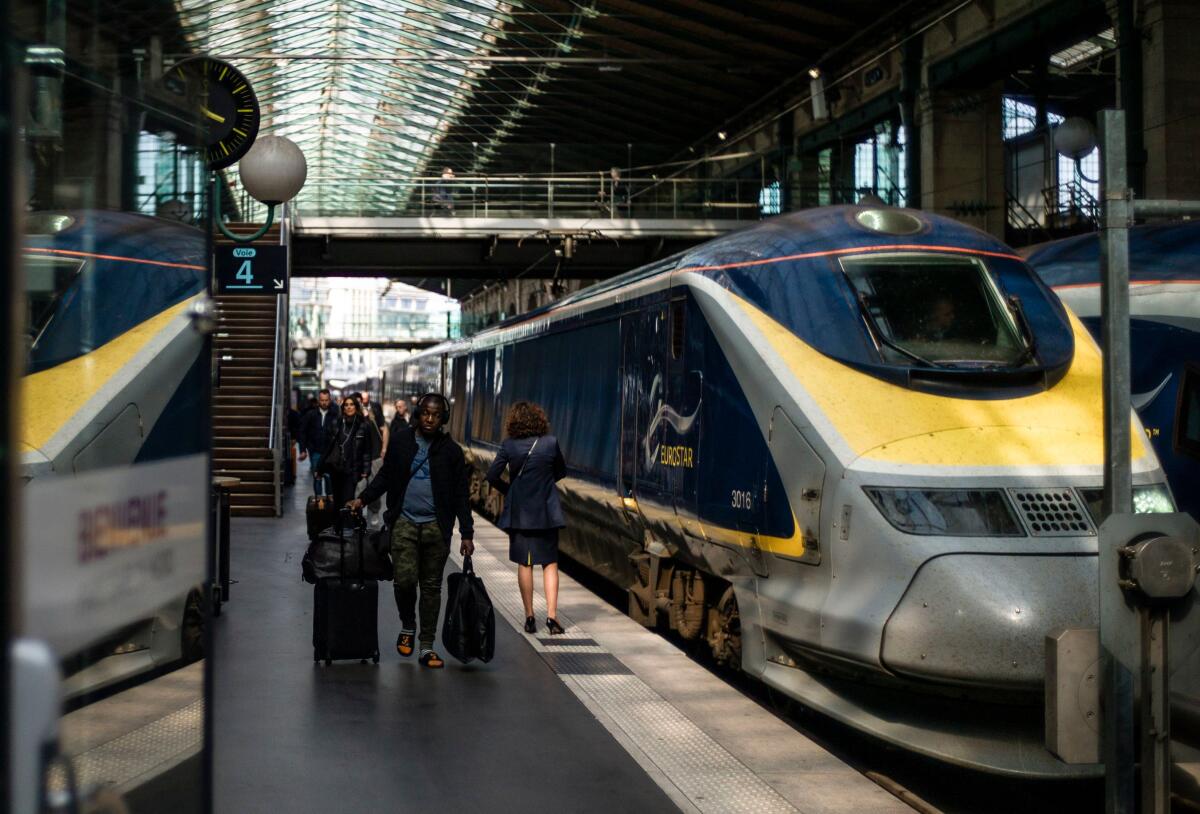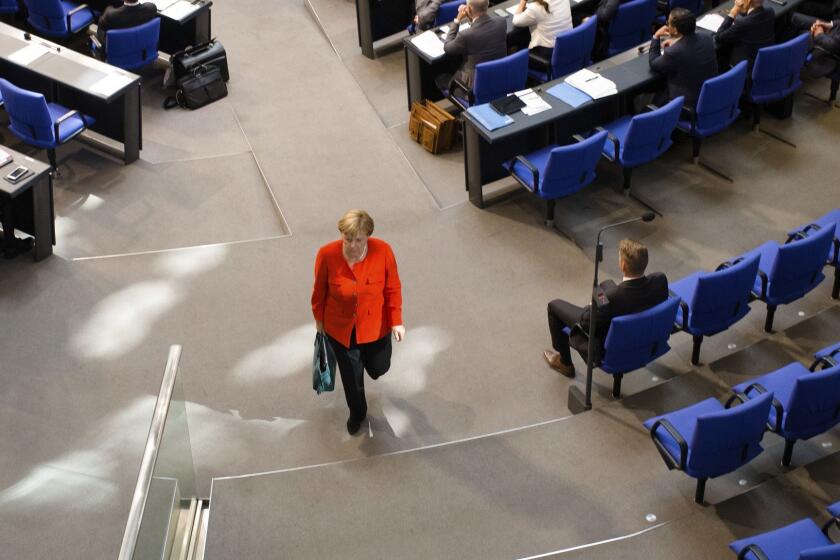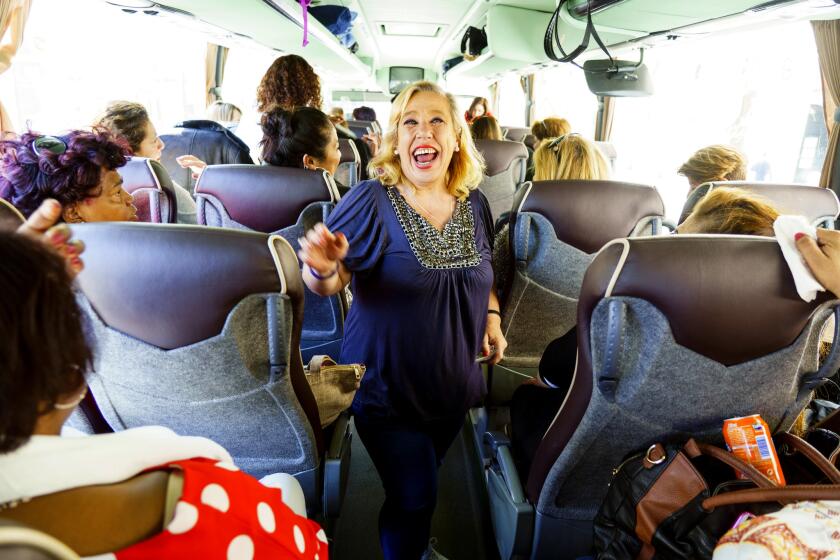Off the rails: How Brexit threatens a popular travel program for young Britons

- Share via
BRATISLAVA, Slovakia — She’s been traveling the world since before she could walk. He first visited Western Europe a year ago. Her friends plan group trips to Paris and Beijing. His friends tend to stay at home.
At first glance, Jasmine Hannah, an 18-year-old from England, and Adam Mathe, 19, from Slovakia, don’t have much in common. They live more than 800 miles apart and grew up in different worlds — a Britain turning away from the European Union, and a Slovakia embracing the bloc after decades of communist rule.
But this summer, both won free Interrail passes from a European Union initiative designed to encourage young people to travel Europe by train. The initiative, called Discover EU, aims to stop the spread of nationalism in Europe and foster a pan-continental identity in 18-year-olds.
The nightclub was dark.
“We saw a lot of young people are not able to travel much, leave their home country much, and increasingly saw that as connected to problems of nationalism,” said Vincent-Immanuel Herr, whose initiative #FreeInterrail inspired the Discover EU program. “In order to build a European identity, we are convinced you need to experience European diversity firsthand.”
Yet the anti-European sentiment that Discover EU aims to combat may soon disqualify British teenagers from participating. Once Britain leaves the EU, anticipated to occur on Oct. 31, young Britons will probably not be able to apply for Discover EU. That will be a blow both to the program and to young Britons eager to explore the continent. Thirteen percent — or 2,587 — of the teenagers selected in Discover EU’s May 2019 lottery were British.
The Interrail is a train pass for European citizens that allows travel to 31 countries within a certain time frame — much like the Eurail passes long popular among American travelers to Europe. The Interrail system, founded in 1972, was once seen as a rite of passage for young Europeans on a shoestring budget; these days, Interrail competes with budget airlines for youth ridership.
Herr and friend Martin Speer dreamed up the #FreeInterrail program after visiting 14 countries by train in 2014. The experience, Herr said, “Europeanized us.”
Initially, they developed a proposal for a program that would give free train passes to all 18-year-old Europeans. But ultimately, the European Commission modified the idea to grant a limited number of train passes through a lottery system.
Since the program launched in June 2018, nearly 50,000 18-year-olds have used the passes, which allow travel among a number of EU countries for up to a month.
Herr and Speer said they were concerned about the emergence of nationalist and anti-European movements in countries such as Britain, Poland, Hungary and Germany. Perhaps, they posited, people who supported these movements did not travel much outside their home countries.
Warning against the danger of intensifying nationalism across Europe, Chancellor Angela Merkel of Germany and European Commission President Jean-Claude Juncker said in separate appearances Wednesday that the rise of populism and the far-right represents an existential threat to the European Union’s future.
About 190 million Europeans, or 37% of the EU population, have never left the country where they lived, according to the Special Eurobarometer, a European Commission report from 2014.
Train travel seemed like a promising solution.
“With the train you can have a feeling of the distance, a feeling of the geography, a feeling of the culture of meeting people, and stopping somewhere and speaking different languages,” said European Commission spokeswoman Nathalie Vandystadt.
Brexit has generated general confusion over train travel between the United Kingdom and the Continent.
In early August, British train operators announced they would leave the Interrail network, but a day later, the operators reversed that decision, writing on Twitter that “Britain’s train companies never wanted to leave Interrail.”
Interrail’s website states that U.K. citizens will be able to travel with a pass regardless of any Brexit outcome. Citizens of two non-EU countries, Switzerland and Turkey, can obtain Interrail passes.
British Discover EU participants said some of their classmates had never left the island.
“Sometimes people our age can’t detach themselves from their homes, and Discover EU awakens ideas about Europe,” said Sophia Till, who planned to travel to the Netherlands and Germany. Till, who is from Suffolk, added: “My identity as a European is not defined by the U.K. political situation.”
“I know quite a few people who have never left England and don’t have any desire to leave either,” said Hannah. “If they had something like this, maybe they would change.”
In July and August, Hannah traveled east, stopping in Berlin, Bratislava and Budapest, Hungary. Mathe, the Slovak she met on her trip, went west, to Zurich, Switzerland, Paris and Brussels. Both had just graduated high school and were on a summer break before starting university.
They met on a warm August night in Bratislava, the capital of Slovakia, where Mathe lives. Hannah had posted her travel itinerary on one of several Discover EU Facebook pages, and Mathe, who had recently finished his trip, offered to show her his home.
Over a typical Slovakian meal — potato dumplings with sheep cheese, and Kofola, a fizzy soda with a faint licorice flavor — Mathe told her about the city’s history. They walked around Bratislava’s old town, finishing the night at a hilltop fortress that overlooked the Danube.
Mathe’s parents grew up in communist Slovakia, where a towering fence separated the east from the west and security guards threatened to shoot any person who attempted to cross into Austria. His parents took their first trip to Western Europe — to Germany — after the Berlin Wall fell.
Mathe now encourages his friends to explore Europe with him. Last year, he brought friends to London, Barcelona and Mallorca.
“I managed to take almost a third or half of my class somewhere,” he said.
Hannah hails from Peterborough, a city in eastern England whose residents largely voted to leave the European Union.
Her family is different, she says. Her mother emigrated from Mexico, and her father, who grew up in a working-class household, started traveling to Europe on ski trips when he was 18. Their family voted to remain in the European Union, and her mother prickles whenever neighbors make negative comments about immigrants.
Hannah’s trip to Bratislava was the first time she had been alone in Eastern Europe. On the nine-hour train ride from Berlin, Hannah practiced her Spanish, posted to Instagram and gazed out the window at the gorges, rivers and sunflower fields dotting the landscape. On her trip, she’d met with friends from other countries and made the acquaintance of people she met on the traveler website Couchsurfing.com.
“I feel European,” she said. “It feels like a sense of community.” Discover EU, she added, was “amazing.”
“It’s sad that in a few years, Britain might not be a part of it.”
More to Read
Sign up for Essential California
The most important California stories and recommendations in your inbox every morning.
You may occasionally receive promotional content from the Los Angeles Times.











